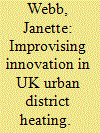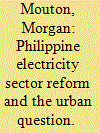|
|
|
Sort Order |
|
|
|
Items / Page
|
|
|
|
|
|
|
| Srl | Item |
| 1 |
ID:
137721


|
|
|
|
|
| Summary/Abstract |
Approaches to ‘sustainability transitions’ stress the possibility of aligning actors around a shared vision of the future, e.g. at the scale of a city. Empirical accounts reveal how difficult such coordination often is due to contradictory views involved. How can we better understand related processes of searching and negotiation? What does this mean for the organization of decision making processes regarding long-term infrastructural change? We analyze a conflict which erupted in Freiburg, Germany when two strategies of reducing environmental impacts of space heating were to be applied in the Vauban ‘model district’: A) Efficient co-generation of heat and power (CHP) combined with district heating systems (DHS), and B) Reducing heat demand by low-energy designs and ambitious energy standards (‘passive house standard’). In order to understand the politics of infrastructure development, we unravel 1) enabling factors and driving forces of the conflict, 2) normative content of opposing viewpoints, 3) resources tapped into for settling the disagreement, and 4) the institutional setup of such decision making about energy policy priorities in the municipality. We reflect on implications of such a perspective on how policies and how governance arrangements should ideally be shaped and take a brief outlook on further research needed.
|
|
|
|
|
|
|
|
|
|
|
|
|
|
|
|
| 2 |
ID:
137732


|
|
|
|
|
| Summary/Abstract |
A higher percentage of energy from renewable resources is an important goal on many environmental policy agendas. Yet, the demand for renewable electricity in liberalized markets has developed much more slowly than the demand for other green products. To date, research has mainly examined the willingness to pay for renewable electricity, but limited research has been conducted on the motivations behind it. The concept of identity signaling has proven to play a significant role in consumer behavior for green products. However, (renewable) electricity in the Swedish residential market typically lacks two important drivers for identity signaling: visibility and product involvement. A consumer choice simulation among 434 Swedish households compared consumer choices for renewable electricity contracts. The results show a positive effect of identity signaling on the demand for renewable electricity and yield suggestions for increasing the share of renewable electricity without market distorting measures. This leads to implications for policymakers, electricity suppliers and researchers.
|
|
|
|
|
|
|
|
|
|
|
|
|
|
|
|
| 3 |
ID:
137744


|
|
|
|
|
| Summary/Abstract |
This paper employs a newly developed non-radial directional distance function to evaluate China's regional energy and CO2 emission performance for the period 1997–2009. Moreover, we analyze the impact of China's market-oriented reform on China's regional energy and carbon efficiency. The main findings are as follows. First, most of China's regions did not perform efficiently in energy use and CO2 emissions. Provinces in the east area generally performed better than those in the central and west areas. By contrast, provinces in the west area generally evidenced the lowest efficiency. Second, Market-oriented reforms, especially the promotion of factor market, were found to have positive effect on the efficiency of energy use and CO2 emissions. Third, the share of coal in the total energy consumption and the expansion of the industrial sector were found to be negatively correlated with China's regional energy and CO2 emissions performance. Based on the empirical findings, we provide policy suggestions for enhancing energy and carbon efficiency in China.
|
|
|
|
|
|
|
|
|
|
|
|
|
|
|
|
| 4 |
ID:
137709


|
|
|
|
|
| Summary/Abstract |
Through the analysis of energy supply choices, this article explores the way in which energy priorities and their climate-related features are incorporated into urban public policy. These choices must take account of different factors, as is the case with district heating, which is justified as a vehicle of renewable energy while subject to pressure in eco-districts because its techno-economic balances are destabilised by falls in demand. Our study focuses particularly on the city of Metz (France), which has chosen district heating as the primary source for provision for the municipal area and for its first eco-district. We analyse the tensions within these choices, with particular attention to the way in which they are negotiated inside municipal departments and with the local energy operator. This enables us to explore the tensions in defining the scale that governs decisions and the linkages between energy-related and urban priorities.
|
|
|
|
|
|
|
|
|
|
|
|
|
|
|
|
| 5 |
ID:
137713


|
|
|
|
|
| Summary/Abstract |
Drawing on recent research in urban policy studies and social studies of technology, this paper examines the capability of urban energy regimes in adapting to environmental policy pressures. Focusing on the case of the City of Los Angeles, we critically analyze the transformative capacity of the city׳s recent energy and climate policies and the innovation patterns of its urban infrastructure regime. This case study suggests that despite considerable success in switching from coal to renewable energies, the patterns of sociotechnical change in Los Angeles still tend to supplement and sustain the existing regime. Sociotechnical change in Los Angeles tends to unfold incrementally through adjustments within the established patterns of the existing regime.
|
|
|
|
|
|
|
|
|
|
|
|
|
|
|
|
| 6 |
ID:
137718


|
|
|
|
|
| Summary/Abstract |
The prevalent theories in the debate on sustainability transitions have been criticised for not sufficiently addressing energy change processes at the local level. This paper aims to enhance our understanding of local energy reorganisation processes. Drawing on the Regional Innovation Systems (RIS) approach, we argue that local development dynamics result from the interaction of various subsystems: science, politics, public administration, industry, finance, intermediaries and civil society. The analysis of the involved subsystems and their interaction shows how energy transitions are shaped by different individual and organisational actors as well as institutions on the local level. Empirical evidence from case studies on the German cities of Emden and Bottrop illustrates our theoretical conceptualisation of energy transitions. We conclude by presenting characteristic interaction patterns for energy transition drawn from the two cases.
|
|
|
|
|
|
|
|
|
|
|
|
|
|
|
|
| 7 |
ID:
137747


|
|
|
|
|
| Summary/Abstract |
Water and energy are important resources for regional economies and are inextricably and reciprocally linked. Global water and energy demand will increase significantly by 2030 while climate change will worsen water availability. Thus, it is important to ensure a sustainable energy supply despite the increasing severity of water resource constraints. Numerous studies have analyzed water requirements to produce energy from production perspectives. However, energy is generally supplied by both internal and external producers. Thus, it is necessary to consider the availability of water to produce energy from consumption perspectives also. We evaluate the water footprint of the energy supply of Liaoning Province, China. We apply the standard top-down approach using an input–output framework. We estimate the water footprint of the energy supply of Liaoning Province at 854 million m3 in 2002, with 47% of water used for electricity and heating. Our results reveal that energy supply could depend on water resources in neighboring provinces; external producers met 80% of the water footprint of energy supply, although only 35% of energy supply was imported. If Liaoning Province decreased its external dependency, withdrawal of available water resources within the province would increase from 86% to 91%. To guarantee future regional energy security, it is important to manage water resources effectively through water-efficient electricity generation and by allocating water resources among sectors.
|
|
|
|
|
|
|
|
|
|
|
|
|
|
|
|
| 8 |
ID:
137730


|
|
|
|
|
| Summary/Abstract |
This article statistically isolates the impacts of city-level permitting and other local regulatory processes on residential PV prices in the United States. We combine data from two “scoring” mechanisms that independently capture local regulatory process efficiency with the largest dataset of installed PV prices in the United States. We find that variations in local permitting procedures can lead to differences in average residential PV prices of approximately $0.18/W between the jurisdictions with the least-favorable and most-favorable permitting procedures. Between jurisdictions with scores across the middle 90% of the range (i.e., 5th percentile to 95th percentile), the difference is $0.14/W, equivalent to a $700 (2.2%) difference in system costs for a typical 5-kW residential PV installation. When considering variations not only in permitting practices, but also in other local regulatory procedures, price differences grow to $0.64–$0.93/W between the least-favorable and most-favorable jurisdictions. Between jurisdictions with scores across the middle 90% of the range, the difference is equivalent to a price impact of at least $2500 (8%) for a typical 5-kW residential PV installation. These results highlight the magnitude of cost reduction that might be expected from streamlining local regulatory regimes.
|
|
|
|
|
|
|
|
|
|
|
|
|
|
|
|
| 9 |
ID:
137723


|
|
|
|
|
| Summary/Abstract |
This paper is interested in sustainable energy initiatives in French rural areas. It follows up the UK debate about ‘localism’. UK policy localism has been cast as neoliberal, framing communities as competent and competitive actors, morally responsible and accountable for their destiny. In France, the emerging policy localism is surfing on an ongoing political structuration of innovative rural territories – ‘Positive Energie Territories’ (TEPOS). The paper presents and discusses the results of a rough census (undertaken in 2012) of significant experiences in this domain. It points to a few experiences and depicts them as risky, trial-and-error transcalar processes that endow locally emergent energy issues with a political dimension. To this extent, they amount to a different way of doing energy policy. The analysis points to an ambiguity in French policy localism. This localism may pave the way for an upscaling of the ongoing TEPOS political structuration, or tend to make TEPOS into demonstration territories within a neoliberal RTD policy approach. In the latter case, it may not necessarily fit territories to pursue their political structuration with a view to the energy transition.
|
|
|
|
|
|
|
|
|
|
|
|
|
|
|
|
| 10 |
ID:
137715


|
|
|
|
|
| Summary/Abstract |
Recent scholarship on urban energy governance has focused on low carbon energy strategies seen as a response to climate change and energy pressure threats. But such approaches tend to overlook the situations of cities from the Global South and emerging countries concerned with strong energy demand growth. The development of urban natural gas networks is an understudied response to such a challenge. Focusing on three cities, Istanbul, Cairo and Sfax (Tunisia), the article analyses the factors and the governance of these energy transitions. It uses a geographical approach to such processes that highlight the mutual influence of the territory in its material and political dimensions and of the policy goals and tools in the implementation. The development of urban gas networks rests upon the proximity of gas deposits. It is determined by metropolitan strategies for economic development as well as by programs aiming to cut energy subsidies. Though urban gas networks have a strong potential for restructuring the physical and social landscapes in cities, the dominant commercial approach taken by energy utilities and morphological constraints in the urban fabric limit their universalization. Natural gas is part of a mix of energies at the urban level and often competes with other energy forms, specifically renewables (like solar water heaters). Lastly, the development of urban natural gas networks sparks heated politics in relation to unfulfilled energy demand and affordability.
|
|
|
|
|
|
|
|
|
|
|
|
|
|
|
|
| 11 |
ID:
137720


|
|
|
|
|
| Summary/Abstract |
Research on district heating has focused on technical-economic appraisal of its contribution to energy and carbon saving in urban centres. There is however lack of analysis of political and social processes which govern its actual take up. This paper examines these processes through a case study of Aberdeen, Scotland. Interviews and documentary analysis are used to examine the 2002 development of Aberdeen Heat and Power (AHP), an independent energy services company (ESCo). Technical-economic feasibility was a necessary component of appraisal, but not sufficient to govern decision-making. In the UK centralised energy market, DH investment is unattractive to commercial investors, and local authorities lack capacity and expertise in energy provision. In Aberdeen, the politics of fuel poverty converged with climate politics, creating an a-typical willingness to innovate through improvisation. The welfare priority resulted in creation of a non-profit locally-owned ESCo, using cost- rather than market-based heat tariffs. AHP has developed three combined heat and power energy centres and heat networks, supplying 34 MWh/pa of heat. Carbon savings are estimated to be 45% in comparison with electric heating, and heating costs are reduced by a similar amount. The conclusion outlines potential policy improvements.
|
|
|
|
|
|
|
|
|
|
|
|
|
|
|
|
| 12 |
ID:
137706


|
|
|
| 13 |
ID:
137708


|
|
|
|
|
| Summary/Abstract |
This paper examines the notion of energy transition when implemented by private utilities. In 2000, the Delhi government privatized electricity distribution to three private distribution companies. Most research was concerned with the impact of privatization on energy reliability, tariff settings and regulation issues. This paper looks at two under-researched themes: the expansion of services to poorer neighborhoods and the rollout of clean energy policies. This focus allows to unpack the materiality of socio-technical systems, to analyze how energy infrastructures are being technically deployed on the ground and to identify which social approach is used. To detail the specific practices of each company provides a more nuanced and accurate understanding of the reform. In-depth analysis of the three private utilities show that they interpret the reform mandate differently: they use a varied range of technical tools; they respond differently to social concerns in poorer neighborhoods; and they have distinctive internal management choices and corporate cultures. All these four factors can strengthen or undermine the transition towards increased access and clean energy.
|
|
|
|
|
|
|
|
|
|
|
|
|
|
|
|
| 14 |
ID:
137749


|
|
|
|
|
| Summary/Abstract |
This paper examines policy and technology scenarios in California, emphasizing greenhouse gas (GHG) emissions in 2020 and 2030. Using CALGAPS, a new, validated model simulating GHG and criteria pollutant emissions in California from 2010 to 2050, four scenarios were developed: Committed Policies (S1), Uncommitted Policies (S2), Potential Policy and Technology Futures (S3), and Counterfactual (S0), which omits all GHG policies. Forty-nine individual policies were represented. For S1–S3, GHG emissions fall below the AB 32 policy 2020 target [427 million metric tons CO2 equivalent (MtCO2e) yr−1], indicating that committed policies may be sufficient to meet mandated reductions. In 2030, emissions span 211–428 MtCO2e yr−1, suggesting that policy choices made today can strongly affect outcomes over the next two decades. Long-term (2050) emissions were all well above the target set by Executive Order S-3-05 (85 MtCO2e yr−1); additional policies or technology development (beyond the study scope) are likely needed to achieve this objective. Cumulative emissions suggest a different outcome, however: due to early emissions reductions, S3 achieves lower cumulative emissions in 2050 than a pathway that linearly reduces emissions between 2020 and 2050 policy targets. Sensitivity analysis provided quantification of individual policy GHG emissions reduction benefits.
|
|
|
|
|
|
|
|
|
|
|
|
|
|
|
|
| 15 |
ID:
137737


|
|
|
|
|
| Summary/Abstract |
In Australia, renewable energy is under pressure in the context of a highly politicised debate about how to act on climate change. The recent repeal of an established carbon tax has seen the defunding of significant renewable energy initiatives and a controversial review of the national Renewable Energy Target is threatening key drivers for investment in renewable energy. The current regulatory focus on community ‘acceptance’ does not facilitate the active community support necessary to challenge this increasingly hostile policy context.This research considers current experiences of community engagement in wind farm governance in one Australian jurisdiction. Through documentary analysis and two qualitative case studies, it examines legal and non-legal requirements for community governance mechanisms and considers how these influence wind farm development in rural areas. Findings include a problematic reliance on procedural compliance in assessing wind farm consultation, domination by vested interests, and reduced expertise in community engagement at the time it is needed most. Recommendations include integration of best practice guidelines in current regulation; harmonisation of policy settings to ensure equity across energy sectors; and an evidence-based commitment to benefit sharing as a strategy for increasing community support of rural wind farm development.
|
|
|
|
|
|
|
|
|
|
|
|
|
|
|
|
| 16 |
ID:
137741


|
|
|
|
|
| Summary/Abstract |
National energy planning has become increasingly complex owing to a pressing need to incorporate sustainability considerations. In this context, we applied least-cost and cost-risk optimization models to allocate energy sources for sustainable development in the Korean electric power generation industry. The least-cost model determined an electricity generation mix from 2012 to 2030 that incurs minimum generation cost to meet electricity demand. The cost-risk model determined electricity generation mixes in 2030 considering the risks associated with each energy source in order to lessen external risks. In deriving these optimal electricity generation mixes, we considered both conventional and renewable energy sources in conjunction with physical and policy constraints that realistically reflect Korean circumstances. Moreover, we accounted for CO2 and external costs within the electricity generation costs for each energy source. For sustainable development in Korea, we conclude that a portion of the coal and gas in the electricity generation mix must be substituted with nuclear and renewable energy. Furthermore, we found that least-cost allocation is sub-optimal from cost-risk perspective and that it limits the adoption of renewables. Finally, we also discuss the implications of decisions taken by the Korean government regarding the electricity generation mix for next-generation energy planning to achieve sustainability.
|
|
|
|
|
|
|
|
|
|
|
|
|
|
|
|
| 17 |
ID:
137714


|
|
|
|
|
| Summary/Abstract |
In the early 2000s, the Philippine government reformed its electricity sector following neoliberal principles: unbundling of the power industry, privatisation of assets and commodification of electricity. This paper shows that the reform was primarily driven by the need to secure electricity supply and cut down tariffs. These national objectives ousted other issues, and notably those that find their expression at the urban level, among which the question of access to electricity in Metro Manila's urban poor communities. The central state withdrew its attention from the issue of electrification, and local actors had to react as they were confronted to social tensions and practices of pilferage. As a consequence, city governments and local administrations are getting involved in this issue, which opens the way to participation of civil society. This paper shows how the “rolling back” of the central state led to new partnerships and arrangements between the distribution utility, local governments and community organisations. This movement points to an urbanisation of energy issues, which could bring positive results for end-users provided that it is accompanied by a clearer regulatory framework.
|
|
|
|
|
|
|
|
|
|
|
|
|
|
|
|
| 18 |
ID:
137751


|
|
|
|
|
| Summary/Abstract |
Wave Energy Conversion (WEC) devices are at a pre-commercial stage of development with feasibility studies sensitive to uncertainties surrounding assumed input costs. This may affect decision making. This paper analyses the impact these uncertainties may have on investor, developer and policymaker decisions using an Irish case study. Calibrated to data present in the literature, a probabilistic methodology is shown to be an effective means to carry this out. Value at Risk (VaR) and Conditional Value at Risk (CVaR) metrics are used to quantify the certainty of achieving a given cost or return on investment. We analyse the certainty of financial return provided by the proposed Irish Feed-in Tariff (FiT) policy. The influence of cost reduction through bulk discount is also discussed, with cost reduction targets for developers identified. Uncertainty is found to have a greater impact on the profitability of smaller installations and those subject to lower rates of cost reduction. This paper emphasises that a premium is required to account for cost uncertainty when setting FiT rates. By quantifying uncertainty, a means to specify an efficient premium is presented.
|
|
|
|
|
|
|
|
|
|
|
|
|
|
|
|
| 19 |
ID:
137746


|
|
|
|
|
| Summary/Abstract |
Greenhouse gas removal (GGR) methods such as direct air capture, bioenergy with carbon capture and storage, biochar and enhanced weathering have recently attracted attention as “geoengineering” options to reverse the build-up of greenhouse gases in the atmosphere. Contrary to this framing, however, we argue that GGR technologies can in fact form a valuable complement to emissions control within on-going mitigation efforts. Through decoupling abatement from emissions sources, they add much-needed flexibility to the mitigation toolbox, increasing feasibility and reducing costs of meeting climate targets. Integrating GGR effectively into policy raises significant challenges relating to uncertain costs, side effects, life-cycle effectiveness and accounting. Delaying policy action until these uncertainties are resolved, however, risks missing early opportunities, suffocating innovation and locking out the long-term potential of GGR. Based on an analysis of bioenergy with carbon capture and storage, we develop four policy principles to begin unlocking the potential of GGR: (i) support further research, development and demonstration; (ii) support near-term opportunities through modifying existing policy mechanisms; (iii) commit to full GGR integration in carbon accreditation and broader climate policy frameworks in future; (iv) develop sector-specific steps that lay the groundwork for future opportunities and avoid lock-out.
|
|
|
|
|
|
|
|
|
|
|
|
|
|
|
|
| 20 |
ID:
137739


|
|
|
|
|
| Summary/Abstract |
This paper is the first attempt to estimate the hydroelectricity rent in Italy, as several concessions are about to expire, and the first to analyze the implications of different redistribution mechanisms. Due to budgetary constraints, local authorities want to capture a higher part of the rent, thought to be considerable. At the same time, the renewal procedure entails the implementation of environmental mitigation measures, as set forth in the water framework directive. Hence, rent-seizing and environmental protection generate a major trade-off. We focus our analysis on the County of Sondrio, home to 18% of the overall hydropower capacity, where the first renewals will take place. We obtain the highest rent ever estimated for hydropower production, averaging from 30.3 €/MWh to 82.4 €/MWh. These high values explain why local authorities are pushing for the introduction of a 30% revenue sharing fee, as they would earn almost 90% of the rent, much more than the 50% currently seized. Albeit satisfying the rent-seizing objective, the proposed fee hinders the implementation of costly mitigation measures. In this paper, we advocate the adoption of a resource rent tax, as we show that it would reduce the trade-off between rent-seizing and environmental protection.
|
|
|
|
|
|
|
|
|
|
|
|
|
|
|
|
|
|
|
|
|